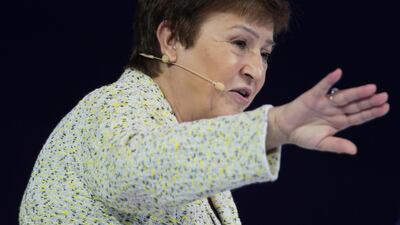Britain can afford to boost its Covid-19 spending further to offset the effects of the pandemic on the economy, the International Monetary Fund said on Thursday, as it expects the country's gross domestic product to contract 10 per cent this year.
“The unprecedented package of fiscal, monetary and financial sector support measures has helped to sustain incomes, keep unemployment down and curb corporate insolvencies. It is one of the best examples of co-ordinated action that we have seen globally,” Kristalina Georgieva told a webinar following a review of Britain’s economy.
"My main message today is that continued policy support is essential to address the pandemic and to sustain and invigorate a recovery. We welcome that the authorities have committed to deliver it as long as necessary to boost expectations and confidence. The policy space exists to do this."
The Washington-based lender said while private debt levels are rising sharply, the banking system remains "well-capitalised and liquid", a reflection of the reforms undertaken after the global financial crisis of 2008, along with measures put in place since the pandemic started in March to preserve financial stability.
UK finance minister Rishi Sunak thanked the IMF for providing a credible independent assessment of the country’s economic plan and said “the conclusion is clear”.
“The IMF has overwhelmingly endorsed our investment plan, saying it will address productivity, climate goals and regional inequality. At the same time, we have a responsibility to ensure the next generation inherits a strong economy backed by strong public finances,” said Mr Sunak.
He unveiled a significant increase in UK government support last week, including more wage subsidies and grants for businesses. The move came despite Britain's public sector borrowing surging to £36.1 billion ($46.59bn) in September, £28.4bn more than a year earlier, as the government's heavy spending to prop up the economy continued.
The IMF said fiscal policy should continue to accommodate the ongoing costs of coronavirus, and commended Mr Sunak's recent adjustments to the Job Support.
"We welcome further reviews to ensure their continued effectiveness in limiting scarring. There is a case to extend guaranteed lending along similar lines, with availability and the burden borne by firms and banks linked to pandemic impact," it said.
The IMF said the pandemic has accounted for a significant human toll in the UK and hit an economy already facing strain from Brexit and longer-term challenges such as low productivity growth.
While the UK started 2020 with a number of advantages, Ms Georgieva said - namely "its strong institutions, highly credible fiscal and monetary policy frameworks, and flexible labour markets" - she warned that GDP has dropped dramatically during the crisis, and private and public debt levels are set to rise significantly.
A sharp initial economic rebound now faces headwinds from a second Covid-19 wave, Brexit-related uncertainty, rising unemployment and stress on corporate balance sheets.
The IMF made a number of recommendation for the UK as it faces “an extraordinarily challenging time”. These included urging the government to keep its special job and company support programmes in place. It also backed an additional fiscal push centred on public investment and urged the UK and EU to reach an agreement before Britain exits the bloc at the end of this year.
"Progress on a range of issues has been made over the past year and there is room for a compromise beneficial to both sides. A solution would remove important downside risks from the outlook," said Ms Georgieva.
The IMF said Britain is on course to rack up a budget deficit of 16.5 per cent of GDP this year, while Ms Georgieva said fixing the public finances could not be ignored but should only happen "once the private sector has durably picked up steam”.
Mr Sunak acknowledged the Fund’s message that it is right to support the economy in the short term, “but over time, and in line with other major economies, we must get our public finances back on a sustainable path”.
The IMF published more pessimistic forecasts for the British economy, which it now sees contracting by 10.4 per cent in 2020 and then growing by 5.7 per cent in 2021, down from estimates published just a few weeks ago.
Ms Georgieva said the Bank of England should continue to keep monetary policy "accommodative" because of the "significant risk" that inflation will undershoot the lender's targets.
"This can be done by scaling up government bond purchases. Other tools like negative rates can be brought in after further understanding is developed on when they would be most useful in the UK context," she said.
The BoE is widely expected to expand its stimulus measures next week, with analysts expecting a further $100 billion in support, while it examines the feasibility of taking its benchmark lending rate - currently at 0.1 per cent - into negative territory for the first time.



